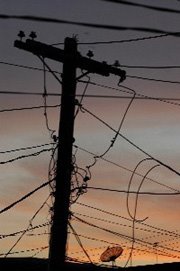 Photo: Slashed power cables dangle from wonky pylons in the Liberian capital, Monrovia
Photo: Slashed power cables dangle from wonky pylons in the Liberian capital, MonroviaAt the end of two months in office, Liberia's peacetime government has released a five-month development agenda to get the country's post-war reconstruction rolling.
The agenda entitled "First 150 Days Action Plan: A working document for a new Liberia" commits President Ellen Johnson Sirleaf's government to a host of goals from economic reforms to humanitarian initiatives before the end of June.
"The 150 Day Action Plan is the first phase of a long-term strategy for reconstruction and development," the government said in a statement on Monday.
The government said the plan would focus on four areas including the revitalisation of the economy, restructuring of the country's police and other security agencies, rebuilding rural infrastructures and strengthening governance and rule of law.
Overarching all these goals are firm measures to tackle corruption, a key commitment at President Ellen Johnson Sirleaf's inauguration speech in mid January.
By the end of June, the government plan said internationally recruited controllers would be placed in major ministries and lucrative sites such as the port, airport, customs office and forestry commission where they will oversee and sign-off on government transactions.
Liberia's international partners and donor drew up a Governance Economic Management Assistance Program (GEMAP) to curb corruption by monitoring revenues and expenditures in the war ravaged country. It was endorsed in September by the previous transitional regime and is intended to ring-fence key sources of revenue for a three-year period.
Under the new action plan, the government made a commitment to downsize what it called the "bloated" civil service, though it fell short of laying out how many jobs would have to go.
Already government workers have begun kicking against the planned downsizing. Jefferson Elliot, president of the civil service association said workers would resort to a "mass action" if the government cuts jobs without finding alternative sources of employment.
Sirleaf, Africa's first female elected head of state, also aims to resettle all remaining 50,000 internally displaced Liberians and repatriate more than half of the 150,000 refugees that fled abroad during the 14 years of on-off fighting.
The agenda commits the government to restoring key services such as water and electricity but did not clarify who could expect to have light at night or water in their taps by the end of June.
Reproduced with the kind permission of IRIN
Copyright IRIN 2006
Photo: Copyright Claire Soares/ IRIN
Disclaimer: This article does not necessarily reflect the views of the United Nations or its agencies
